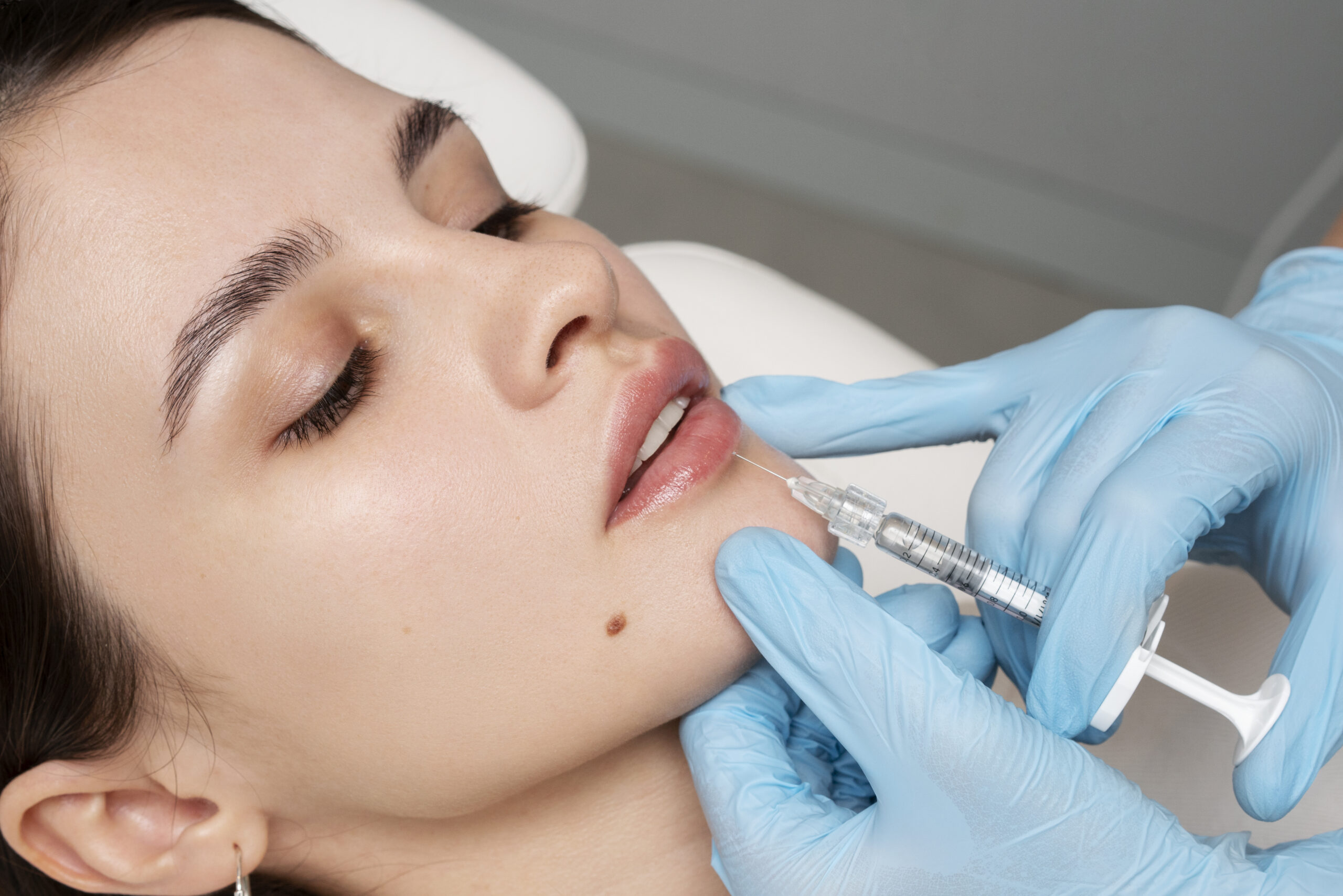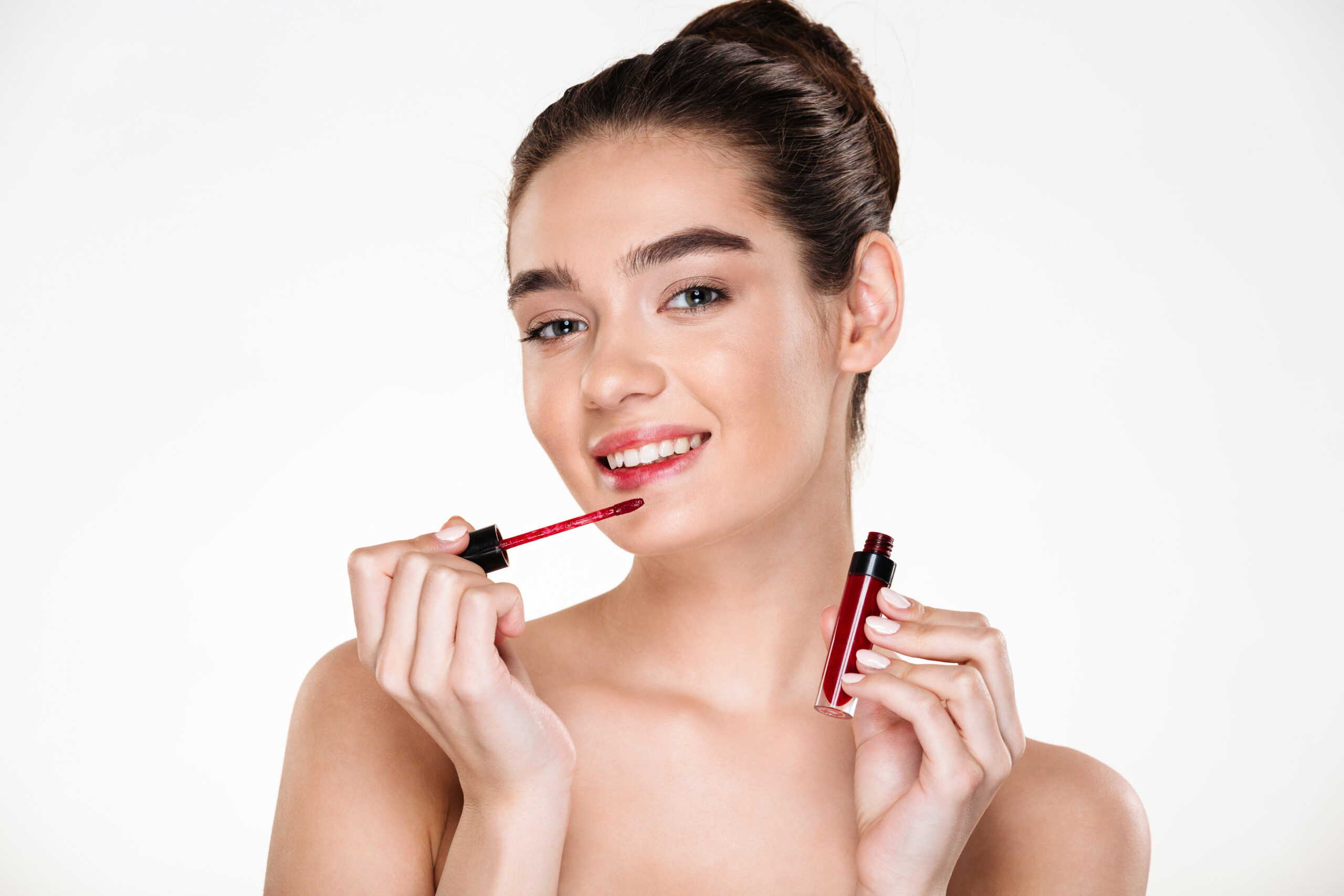Aesthetic medicine procedures have become more affordable, allowing more people to address their flaws and imperfections. Importantly, these procedures are not necessarily painful and do not require a recovery period. Aesthetic medicine has advanced to the point where lip augmentation can be done in various ways, ensuring satisfactory results.
Lip fillers can be completely noninvasive—a quick, safe treatment that doesn't necessitate a recovery period. Lip augmentation with hyaluronic acid or uplifting can be done just before important events, celebrations, parties, and even weddings.

Surgical lip augmentation![]() is the most invasive procedure because it involves cutting the skin tissue, which must heal. Lip filling is usually performed with silicone implants or other fillers. Surgery can enlarge the lips and shape them almost any way you want. The results obtained in this way last for a long time.
is the most invasive procedure because it involves cutting the skin tissue, which must heal. Lip filling is usually performed with silicone implants or other fillers. Surgery can enlarge the lips and shape them almost any way you want. The results obtained in this way last for a long time.
Despite this, many women – wanting to avoid a scalpel – decide on less invasive procedures, among which the following are popular.
Hyaluronic acid![]() is currently the most widely used substance for lip enhancement. It has been on the market for over 20 years, making it a well-tested option with predictable results. This material allows for lip enlargement, shaping, lifting the corners, and smoothing the lips. The effects of the procedure typically last for about 12-16 months. If necessary, the substance can be dissolved earlier with a c*********e injection.
is currently the most widely used substance for lip enhancement. It has been on the market for over 20 years, making it a well-tested option with predictable results. This material allows for lip enlargement, shaping, lifting the corners, and smoothing the lips. The effects of the procedure typically last for about 12-16 months. If necessary, the substance can be dissolved earlier with a c*********e injection.
Hyaluronic acid is administered using a thin needle or cannula under anesthesia with a special cream or dental anesthesia. Swelling of the lips is standard for three days after the procedure, with the volume usually decreasing. Bruising may appear, and lumps may be felt for 2-3 weeks following lip enhancement.
Lip augmentation using one's fat![]() is another popular method. While it doesn't allow for as significant a change in shape as hyaluronic acid, it does increase lip volume. The procedure involves extracting a small amount of fat, similar to liposuction. The fat is then injected into the lips with a cannula. Initially, the volume is larger; over several months, the fat undergoes reconstruction and healing. About half of the injected volume gains vascularization and remains in the new place permanently after several months. Lip augmentation with fat is often combined with a transplant to other parts of the face and can be done with local anesthesia or intravenous sedation.
is another popular method. While it doesn't allow for as significant a change in shape as hyaluronic acid, it does increase lip volume. The procedure involves extracting a small amount of fat, similar to liposuction. The fat is then injected into the lips with a cannula. Initially, the volume is larger; over several months, the fat undergoes reconstruction and healing. About half of the injected volume gains vascularization and remains in the new place permanently after several months. Lip augmentation with fat is often combined with a transplant to other parts of the face and can be done with local anesthesia or intravenous sedation.
Surgical methods for lip augmentation include the use of permanent silicone![]() . This method involves inserting a permanent implant of an appropriate shape into the orbicularis oculi muscle through two small incisions in the red lip. Local anesthesia is typically sufficient, and the enlargement effect is permanent. While the method is safe and allows the implant to be removed in case of intolerance, it has been replaced by less invasive procedures.
. This method involves inserting a permanent implant of an appropriate shape into the orbicularis oculi muscle through two small incisions in the red lip. Local anesthesia is typically sufficient, and the enlargement effect is permanent. While the method is safe and allows the implant to be removed in case of intolerance, it has been replaced by less invasive procedures.
Another surgical procedure is the lip lift![]() , which involves removing a strip of skin at the base of the nose, on the border with the white (skin) of the upper lip part. It allows for the eversion and an increase in the height of the middle 2/3 of the red upper lip. Local anesthesia is usually sufficient.
, which involves removing a strip of skin at the base of the nose, on the border with the white (skin) of the upper lip part. It allows for the eversion and an increase in the height of the middle 2/3 of the red upper lip. Local anesthesia is usually sufficient.
It's a very effective method of correction for an increase in the height of the white (skin) lip associated with aging. The scar after the procedure rebuilds for at least six months, and thanks to its location in the natural depression under the nose, it becomes less visible.
The lips can also be enlarged using cortical skin grafts![]() , often used to correct post-cleft deformities. The shape of the lips can also be changed by cutting out small fragments of skin on the border of the red lip (mucosa) and white (skin). If the desire is to reduce the volume of the upper or lower lip, the surgeon removes fragments of the mucosa at the border of the dry and wet lip.
, often used to correct post-cleft deformities. The shape of the lips can also be changed by cutting out small fragments of skin on the border of the red lip (mucosa) and white (skin). If the desire is to reduce the volume of the upper or lower lip, the surgeon removes fragments of the mucosa at the border of the dry and wet lip.
There are many lip augmentation makeup products. Some work by causing only an optical effect of enlargement, and others enlarge the lips in a standard way, e.g., by irritating the skin tissue or stimulating microcirculation.
Such cosmetics include:
In addition to lip glosses and lipsticks, lip liners are among the cosmetics that optically enlarge the lips. Lip enlargement with a lip liner can be achieved by applying the cosmetic traditionally around the lips or under lipstick, increasing the durability of the makeup.

While lip augmentation in beauty salons can be highly effective, not everyone is convinced of its benefits, and not everyone can afford it. The effects obtained in this way may also not suit our aesthetic sense. Many people choose less invasive and cheaper ways to change their appearance gently. An alternative to paid treatments is regular and proper lip care at home. Home care will not permanently enlarge your lips, but it can make lips look healthier and fuller.
Chapped and dry lips![]() are a problem for many women, especially in the autumn and winter, when irritation is easy. The epidermis on the lips is shallowly vascularized and thin, so it is necessary to use appropriate care to maintain a radiant smile. The greatest attention should be paid to moisturizing and protection against UV radiation
are a problem for many women, especially in the autumn and winter, when irritation is easy. The epidermis on the lips is shallowly vascularized and thin, so it is necessary to use appropriate care to maintain a radiant smile. The greatest attention should be paid to moisturizing and protection against UV radiation![]() . In this respect, protective lipsticks with SPF and moisturizing balms and masks will be invaluable. These products do not have to be expensive – it is important that they are enriched with vitamins A, E, or B5 and in oils that will “close” the moisturizing ingredients.
. In this respect, protective lipsticks with SPF and moisturizing balms and masks will be invaluable. These products do not have to be expensive – it is important that they are enriched with vitamins A, E, or B5 and in oils that will “close” the moisturizing ingredients.
Regular exfoliation will help remove dead skin flakes. You can buy a scrub at a drugstore or make it yourself. A popular and safe suggestion is a mixture based on honey and sugar — natural humectants that can be in every home. Gently massage the exfoliation with your fingers or leave it on the skin for a few minutes, moving your lips slightly. Frequent and gentle exfoliation will moisturize them and improve their blood circulation, giving an immediate effect of fuller and more defined lips.
The fashion for plump lips has caused many guides to circulate on the Internet presenting increasingly inventive methods for lip augmentation at home. However, remember that not all solutions found online are safe for health.
Exercises are also of great importance. Lip gymnastics comes from facial yoga![]() and is intended to firm the lips, lift sagging corners, and prevent facial wrinkles. This method involves daily, several-minute “workouts, ” best done in front of a mirror, alternately tensing and relaxing the muscles. The most popular exercises of this type include kisses, wide smiles, moving air between the lips, and loudly pronouncing vowels while opening the mouth as wide as possible. The minimum time to observe the first effects is 2 to 4 weeks.
and is intended to firm the lips, lift sagging corners, and prevent facial wrinkles. This method involves daily, several-minute “workouts, ” best done in front of a mirror, alternately tensing and relaxing the muscles. The most popular exercises of this type include kisses, wide smiles, moving air between the lips, and loudly pronouncing vowels while opening the mouth as wide as possible. The minimum time to observe the first effects is 2 to 4 weeks.
Lip augmentation exercises are one method that can surprise with its results and have no side effects. Gymnastics can be easily incorporated into a daily care ritual, and the movements themselves can be a source of great fun. Another great advantage of this method is its zero cost—all you need is a mirror and your lips.
Combined with massages, peelings, and highlighting make-up – exercises allow you to achieve long-term visible aesthetic results without fear of harmful interference with your health.
Unfortunately, there are no clear answers about how long lip fillers last![]() because their duration depends primarily on the chosen method and the individual body's reaction.
because their duration depends primarily on the chosen method and the individual body's reaction.
In most cases – whether after surgery or laser, needle-free lip augmentation – the effect is visible immediately. After invasive procedures, the lips may initially be swollen and irritated, and you must wait a few days for them to heal fully.
It also depends on the method.
Lip fillers should not be planned if you are trying to conceive, as it is not recommended for pregnant women to undergo procedures involving needles or scalpels or to use various substances. It also applies to breastfeeding, as substances may pass into the baby's digestive system through the food.
Contraindications to lip fillers![]() include infections and taking certain medications, including antibiotics and anticoagulants.
include infections and taking certain medications, including antibiotics and anticoagulants.
Patients with autoimmune diseases should also avoid lip augmentation. Visits to the dentist should also be avoided for some time after the procedure, so it is better to solve any dental problems beforehand.
Wearing an orthodontic appliance is another one. For a few days after the incision or injections, you should avoid alcohol, smoking, and physical exertion.
You should not expose your skin to the sun or use a solarium right after the procedure. Lip augmentation cannot coincide with permanent make-up or vaccinations. The person who is to perform the procedure should be informed about all such events.
Discuss with them the issue of possible painkillers to be used after the injections or incisions. Many specialists recommend paracetamol for the first few days.
The more invasive the method used, the more severe the pain after lip augmentation. Surgical techniques involving tissue incisions are, therefore, the most painful. Healing after them takes the longest, and the discomfort is the most severe.
After an acid or other filler injection, the tissue must also regenerate, which usually takes a few days and does not require treatment.
Some specialists recommend non-steroidal anti-inflammatory drugs such as ibuprofen and paracetamol during the first few days. However, it is best to discuss the procedure in detail with the specialist performing the procedure and follow their instructions.

Any interference with the body and organism is not indifferent. Although the procedure involves the introduction of hyaluronic acid or other fillers that are safe for human tissues and harmless to health, the puncturing itself may cause some discomfort.
The side effects of lip fillers![]() include:
include:
Minor hypersensitivity to pain and swelling are temporary side effects of lip augmentation with acid. They usually disappear on their own within a few days and do not require treatment. Small white spots on the lips may also cause concern for patients – these sebaceous glands have become more visible after the procedure, but there is no need to treat them.
Lumps form if the product administered is too thick, the acid was injected too shallowly or too deep, or too much of the preparation was administered to a point. In mild cases, massaging the lips is enough; however, you should not do this yourself; it is best to seek advice from the doctor who performed the procedure.
Ischemia and embolism are the effects of injecting acid into the area or even into a blood vessel. They lead to necrosis. Fortunately, blockage of the vessel lumen is very rare. This complication is easy to rule out because symptoms such as pain, whitening, and bruising occur immediately after the acid is injected before the patient has time to leave the office.
Bacterial infections, inflammations, or abscesses do not occur after procedures performed with an aseptic technique in an adapted aesthetic medicine office. Much also depends on the patient and the care after the procedure.
The most important thing for patients is not to ignore ailments other than those described by the doctor as natural effects of acid interference. Increasing swelling, swelling lasting more than five days, worsening bruising, or sudden hypersensitivity to pain in the lips after hyaluronic acid means that you should immediately seek advice from an aesthetic medicine doctor. The enzyme h***********e is used to dissolve the acid. In the event of inflammation or an allergic reaction to any preparation ingredients, action should be taken as soon as possible.